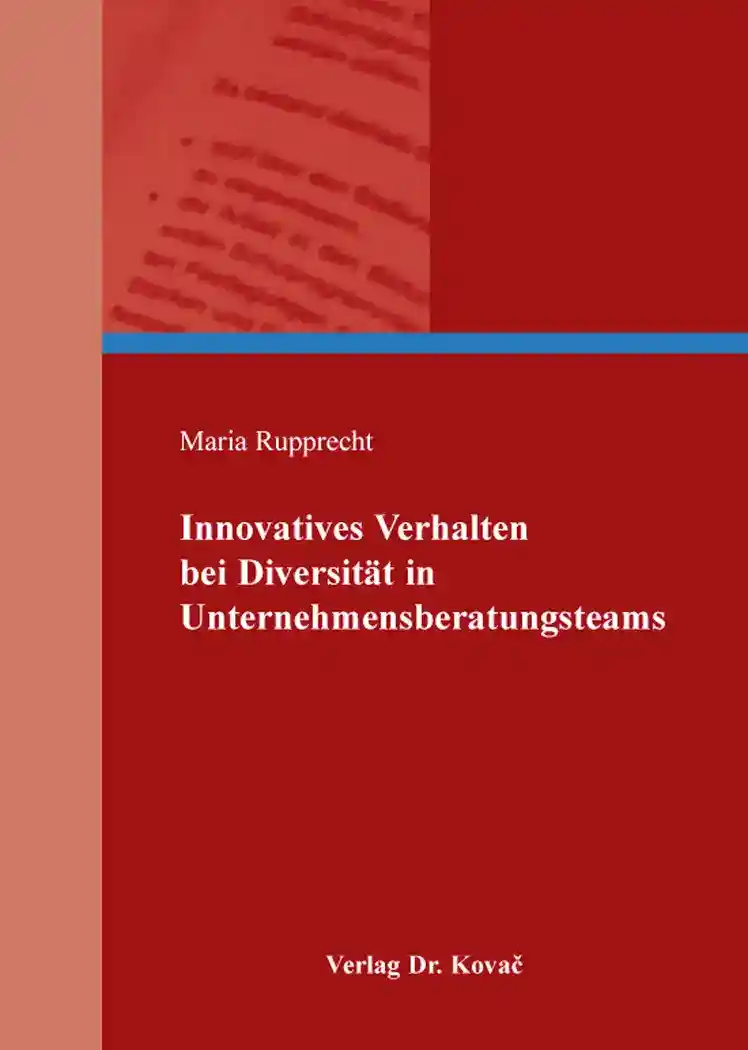Maria RupprechtInnovatives Verhalten bei Diversität in Unternehmensberatungsteams
Schriften zur Arbeits-, Betriebs- und Organisationspsychologie, volume 70
Hamburg 2014, 374 pages
ISBN 978-3-8300-7535-6 (print) |ISBN 978-3-339-07535-2 (eBook)
About this book deutschenglish
Recent research on diversity and innovation highlights the importance of team diversity to foster innovative performance. However, there are inconsistent results whether diversity in teams has a positive or negative effect on innovative behaviour and it is not clear what factors underlie the observed effects. In this contribution it is examined how diversity in project teams is related to innovative behaviour. It is assumed 1) that innovative behaviour differs in homogeneous and heterogeneous project teams, 2) that the relation between diversity in project teams and innovative behaviour is affected by a) the learning behaviour and b) the mental model in the team, and 3) that research on diversity and innovation has to be examined from the particular domain’s perspective (here: consultancies). The aim of this research is to identify in what way diversity and innovative behaviour in consulting teams are related and how the learning behaviour and the common understanding as well as interaction effects between diversity, team learning behaviour and the mental model within the team mediate this relation. The research project was realised in three empirical phases: 1) a Delphi study that served to clarify what characterises diversity and innovation respectively innovative behaviour in consulting teams (study 1), 2) an interview study to shed light on what characteristics of team processes in consulting projects can lead to innovation (study 2), and 3) a pilot study in order to validate the quality of the questionnaire by which diversity, learning behaviour, mental models and innovative behaviour in consulting teams is measured (study 3), and a quantitative main examination with teams of consultants to investigate the assumptions (study 4). The results show a) that joint learning activities of knowledge development and reflection in teams as well as the development of a common representation of the current situation and of an ideal future state are positively related to innovative behaviour, and b) that cognitive diversity might have a negative effect on innovative behaviour, whereas demographic and informational diversity show no relation with innovative behaviour. Also the results indicate c) that the direct effect of aspects of demographic and informational diversity on innovative behaviour seems to be too weak to be measured, and d) that there might exist a n - shaped relation between diversity and innovative behaviour.Keywords
DelphistudieDiversitätFragebogenstudieGeteilte VisionInnovatives VerhaltenInterviewstudieMehrebenanalyseTeamlernenTeam mental modelTeamwork in BeratungsprojektenUnternehmensberatungWissensentwicklungWissensintensiver DienstleistungssektorIhr Werk im Verlag Dr. Kovač

Möchten Sie Ihre wissenschaftliche Arbeit publizieren? Erfahren Sie mehr über unsere günstigen Konditionen und unseren Service für Autorinnen und Autoren.
